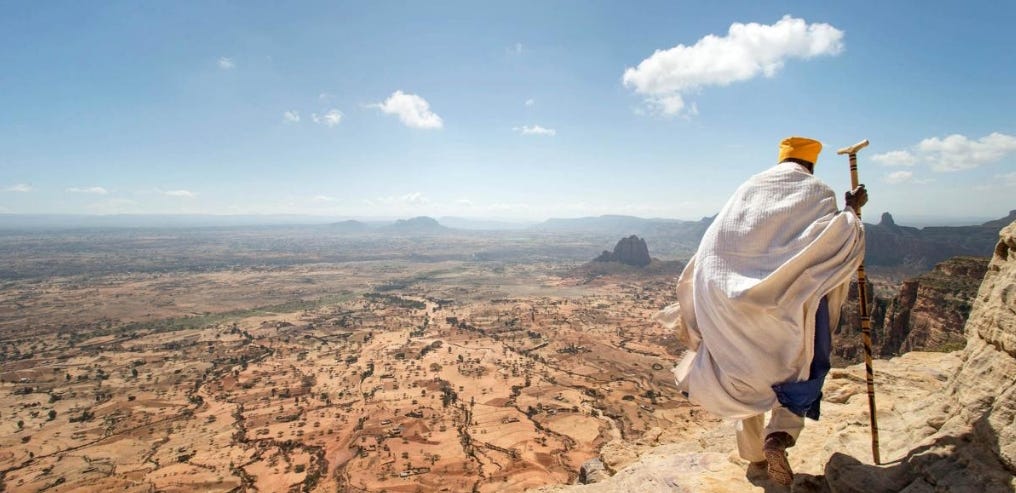But now ask the animals and they will teach you,
or the birds of the sky and they will tell you,
or speak to the Earth and it will teach you:
In His hand is the life of every creature,
and the breath of all the human race.
Job 12:7-8,10
When I was a teacher in a wilderness therapy program, I cared for a boy, let's call him Adam, whose baby sister had been killed by his stepdad, while he and his mom went out for groceries.
The thought that he'd left her alone, when something in his heart had told him not to; the thought that he hadn't been home to protect her, as any big brother ought to have done: Man, it killed him—the look on his face was like he'd be slain forever.
Adam was so deeply, deeply tangled up and torn to shreds inside—and had been for years, and probably still is now, if he isn't dead—and for good reason!
And what do you say to something like that?
I said, “I love you, bro,” and gave him a hug. I just tried to be present to him, bear witness to his struggle—and keep him fed, get him his meds in time, make sure he did his laundry, his schoolwork, and so on—easy, non-exalted stuff to keep things tumbling along towards death for another day, without falling in.
And we often went kayaking on serene, sky-reflecting water, too, sliding across fast images of fast white clouds, surrounded by fragrant clouds of purple loosestrife on the shore—horizon to horizon, the sky seemed so vast and fresh for us—moments of bittersweet ephemerality, only, among the court-ordered 90 days of Sabbath rest from his 24/7 ghetto of 7-Elevens and soulless concrete.
And there was this tiny, tiny white dude in the program, let's call him Elroy, deceptively harmless looking rocking with his weighted blanket, but actually quite crazy, who yelled all the time and about tried to kill me when I took his Legos away as the severest possible consequence I could think of, after he was gunslinging racial slurs at some massive, massive black dudes from the streets of Milwaukee, who actually were about to kill him, if only I'd “get out of [their] goddamn way.”
It said in his intake paperwork that, to the age of three, it was unclear who, if anyone, was changing Elroy's diapers, keeping him fed and so on—he was often found by social workers alone and crying, mom anywhere but home, high as a satellite; he was almost always suffering diaper rash when they came for a visit.
So I think Elroy loved his Legos, because Legos were a tiny world in which he could arrange everything exactly as he knew in his heart of hearts the real world should have unfolded for him, but obviously hadn't:
Here are the gentle green trees, blue water, and golden grass.
And here are the gentle stones, waiting patiently for a billion years.
And here is the house of warm stones, open to the breeze, but invincible to every storm: A gentle and quiet house, everything in its right place—and always will be.
And here is the father of the house: Far-seeing, strong, and gentle—with the bearded soul of a pirate, and the unconquerable heart of a lion.
And here is the mother of the house, of course coming at the faintest cry: Nurturing, generous, attentive, and serenely gentle—a beautiful haven, a land flowing with milk and honey.
Legos were the only paradise Elroy believed in, and so it was harsh of me to take them, place them in the darkness of a three-day hiatus. Then again, he shouldn't have been using his mouth as a flamethrower, either, burning up these two beautiful human thugs—each with his own unimaginable suffering to bear—with heart-desolating words, even the mildest of which I don't want to replicate here: Deny the humanity of your brothers in the real world, and you don't get to build your own little pretend world where berserk hatred like that is lauded as a virtue, is how I wish I had explained it at the time—but I was yelling, also, anguish in my own heart, throwing a tantrum at the world for being exactly what it was, what it never should have been.
So later, when we went gliding along the blue sky-mirror in our kayaks, making clouds ripple like two dolphins chasing a lemon-colored dahlia of radiant sun, it helped me feel better, too—a spacious, rehumanizing, bright-air return for me, also, to the ancestral homeland of our human bodies: Mother Earth, Father Sky.
The world is passing away along with its desire.
The world, not the Earth—the world, that which “lies between people,” as Hannah Arendt says, an all-devouring “in-between,” the intersubjective tribal daydream over which humans abuse and kill one another on Earth's surface—this is what's passing away, along with its desire—not the Earth.
Earth is human lungs and human breath, the smell of marigold-colored dust and the long shush of lush meadow grasses and the shush-shush of grassy wind, the flickering of locust wings eating up the flaming apple of dawn—but the world is money; the world is clothing and imaginary power.







